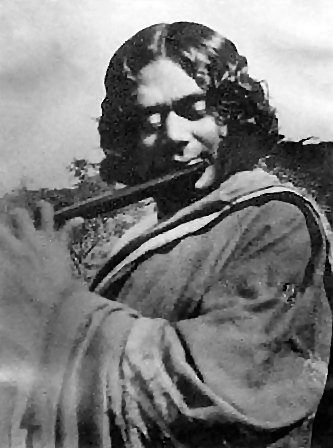Kazi Nazrul Islam (Bengali: কাজী নজরুল ইসলাম, pronounced [kazi nozrul islam]; 24 May 1899 – 29 August 1976) was a Bangladeshi poet, writer, musician, and revolutionary from Bengal. He is the national poet of Bangladesh.[2] Popularly known as Nazrul, he produced a large body of poetry and music with themes that included religious devotion and rebellion against oppression.[3] Nazrul's activism for political and social justice earned him the title of "Rebel Poet" (Bengali: বিদ্রোহী কবি; Bidrohi Kobi).[4] His compositions form the avant-garde genre of Nazrul Sangeet (Music of Nazrul). Nazrul and his works are equally commemorated and celebrated in Bangladesh and India, particularly in India's Bengali-speaking states such as West Bengal, parts of Assam, and Tripura.[5][6][7][8]............
(Bengali: কাজী নজরুল ইসলাম, pronounced [kazi nozrul islam]; 24 May 1899 – 29 August 1976) was a Bangladeshi poet, writer, musician, and revolutionary from Bengal. He is the national poet of Bangladesh.[2] Popularly known as Nazrul, he produced a large body of poetry and music with themes that included religious devotion and rebellion against oppression.[3] Nazrul's activism for political and social justice earned him the title of "Rebel Poet" (Bengali: বিদ্রোহী কবি; Bidrohi Kobi).[4] His compositions form the avant-garde genre of Nazrul Sangeet (Music of Nazrul). Nazrul and his works are equally commemorated and celebrated in Bangladesh and India, particularly in India's Bengali-speaking states such as West Bengal, parts of Assam, and Tripura.[5][6][7][8]............
Born in a Bengali Muslim Kazi family, Nazrul Islam received religious education and as a young man worked as a muezzin at a local mosque. He learned about poetry, drama, and literature while working with the rural theatrical group Letor Dal. He joined the British Indian Army in 1917. After serving in the British Indian Army in the Middle East (Mesopotamian campaign) during World War I,[9] Nazrul established himself as a journalist in Calcutta. He criticised the British Raj and called for revolution through his poetic works, such as "Bidrohi" ("বিদ্রোহী", 'The Rebel') and "Bhangar Gaan" ("ভাঙার গান", 'The Song of Destruction'),[10] as well as in his publication Dhumketu ('The Comet'). His nationalist activism in Indian independence movement led to his frequent imprisonment by the colonial British authorities. While in prison, Nazrul wrote the "Rajbandir Jabanbandi" ("রাজবন্দীর জবানবন্দী", 'Deposition of a Political Prisoner').[11] His writings greatly inspired Bengalis of East Pakistan during the Bangladesh Liberation War.
Nazrul's writings explored themes such as freedom, humanity, love, and revolution. He opposed all forms of bigotry and fundamentalism, including religious, caste-based and gender-based.[12] Nazrul wrote short stories, novels, and essays but is best known for his songs and poems. He created the first Bengali language ghazals.[13][14][15] He is also known to have experimented with Arabic, Persian, and Sanskrit words in his works to produce rhythmic effects.[16][17]
Nazrul wrote and composed music for nearly 4,000 songs (many recorded on HMV and gramophone records),[18] collectively known as Nazrul Geeti. In 1942 at the age of 43, he began to suffer from an unknown disease, losing his voice and memory. A medical team in Vienna diagnosed the disease as Pick's disease,[19] a rare incurable neurodegenerative disease. It caused Nazrul's health to decline steadily and forced him to live in isolation in India. He was also admitted in Ranchi (Jharkhand) psychiatric hospital for many years. At the invitation of the Government of Bangladesh, Nazrul and his family moved to Dhaka in 1972. He died four years later on 29 August 1976 in Bangladesh.[15]
Source
Plagiarism is the copying & pasting of others work without giving credit to the original author or artist. Plagiarized posts are considered spam.
Spam is discouraged by the community, and may result in action from the cheetah bot.
More information and tips on sharing content.
If you believe this comment is in error, please contact us in #disputes on Discord
Hi! I am a robot. I just upvoted you! I found similar content that readers might be interested in:
https://en.wikipedia.org/wiki/Kazi_Nazrul_Islam
Yes i read and take the story ...
Congratulations @absrana! You received a personal award!
You can view your badges on your Steem Board and compare to others on the Steem Ranking
Do not miss the last post from @steemitboard:
Vote for @Steemitboard as a witness to get one more award and increased upvotes!